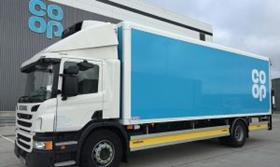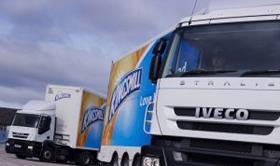As the UK inflation rate rose through the year to reach 3.1% in November, the highest in nearly six years, 2017 saw industrial unrest gather momentum in the logistics sector, as drivers demanded increased pay or bridled against company measures to cut costs.
Yet, despite the rhetoric on both sides, few of the clashes resulted in strike action, with most solved through negotiation.
January
The New Year saw DHL Supply Chain plunged into controversy when 19 drivers at its West Thurrock depot were balloted for strike action. The dispute centred around a driver who allegedly had his wages docked by around £5,200 over seven months after being involved in a road traffic incident.
Unite claimed DHL Supply Chain management failed to download footage from the forward facing camera which would have exonerated the driver. The dispute was settled at the end of the month.
February

The union said the move was part of a cost cutting agenda and accused Argos of failing to guarantee workers’ future terms and conditions after the transfer. Argos countered by accusing Unite of making “a series of demands based on entirely theoretical scenarios”.
April
The GMB’s campaign against the gig economy moved up a gear in April as it launched legal cases against Birmingham-based logistics company UK Express Delivery and Slough-based DX Group.
GMB argued both firm’s self employed drivers should be classed as workers, making them potential employees and warned it had other logistics companies in its sights.
The union’s action followed its successful case against Uber in October 2016 when the London Employment Tribunal found in its favour, ruling that Uber had acted unlawfully by not providing drivers with basic workers’ rights.
May
May saw a rash of industrial disputes, beginning with the GMB launching yet another legal case - this time against Hermes - as part of its gig economy campaign.
The same month saw a dispute flare at Cemex after 82 HGV drivers based at depots in Rugby, Tilbury, Barton-on-Humber and Newport rejected the company’s pay offer, which Unite condemned as “nothing more than a pay cut in real terms.”
After an 87% vote in favour of strike action at the concrete and aggregates firm, Cemex upped its offer, resulting in the 82 drivers calling off their planned strike action and accepting the new deal.

Industrial action was also averted at DHL Supply Chain operations in South Yorkshire. Warehouse operatives across three sites were threatening 15 days of strikes in protest against a proposed pay rise of 1.25% and the closure of DHL’s Harworth site, following the loss of a contract to Great Bear Distribution.
Further negotiations resulted in an improved pay offer of 2.6% and assurances that those DHL warehouse workers transferring to Great Bear’s site at Markham Vale would have their terms and conditions protected.
June
A pay parity dispute at Gist’s Hemel Hempstead DC rumbled on through May, with warehouse operatives threatening 12 days of strike action to protest pay differentials.
Twenty three pickers and loaders at the Three Cherry Trees site, which delivers food to M&S stores in London and the South East, were protesting an £8,000 annual pay gap between themselves and other members of staff performing the same role.
However at the 11th hour the series of strikes were suspended for talks to take place with conciliation service ACAS.
Almost 50 refuse and recycling drivers and loaders at Reigate and Banstead Borough Council voted 97% in favour of strike action in protest against changes to holiday pay.
The dispute centred on new staff contracts that added an extra five days holiday but removed bank holiday overtime pay.
Further negotiations saw the strike action called off after council members voted to accept a reinstatement of the drivers original holiday terms.
July
By early July ACAS talks to end the pay parity dispute at Gist’s Hemel Hempstead depot had delivered a resolution.
The deal, which saw Gist deliver pay parity to 23 pickers and packers at the depot, saw Unite members vote in favour of the deal and all threat of strike action ditched.
August
The dispute over Argos’ plans to transfer nearly 500 workers from its Lutterworth distribution hub in Leicestershire to Wincanton Logistics in Kettering escalated as the summer wore on.
Failure to reach a resolution resulted in an “overwhelming” vote for strike action by Unite members at the site, with the first strike tabled for 15 August.
Meanwhile the war of words between the two parties continued with Unite accusing Argos owner Sainsbury’s of “pulling strings” behind the scenes as part of a cost cutting agenda, and Argos dismissing the union’s demands as “unreasonable and wholly unnecessary.”
Despite the rhetoric talks continued as the strike action drew near.
Another retailer facing the prospect of strike action in August was the Co-op, after the firm dismissed two disabled drivers at its West Thurrock distribution depot.
Unite announced it would ballot for strike action after accusing the retailer of behaving in an “appalling manner” by using a capability process that measured the drivers’ medical condition and ability, which it claimed resulted in them being sacked rather than made redundant. The Co-op said the measure was “a last resort” and said it was willing to continue talks.

September
Long running talks between Royal Mail and the Communications Workers Union (CWU) finally broke down in September, resulting in the union confirming it would be balloting its members for industrial action over a host of issues including pensions at Royal Mail.
CWU said the Royal Mail’s privatisation had led to “to actual and intended attacks on our members’ pensions, terms and conditions and ways of working.”
As broker Liberum recommended Royal mail shareholders sell their shares the beleaguered postal service insisted there were “no grounds for industrial action”, and called for talks to continue.
October
The prospect of strike action in the run up to Christmas by Royal Mail workers was averted after the postal operator won a court ruling against the Communication Workers Union (CWU).
The High Court found that any industrial action taking place before the dispute resolution procedure had been completed would be unlawful.
Royal Mail pledged to begin the external mediation process immediately but said it would not be completed until "close to Christmas", if not longer.
DHL Tradeteam was hit by a double whammy of industrial action in October when both Unite and GMB took up the cause of workers at the firm’s Enfield depot.
The disputes were triggered by drivers’ claims of “draconian working conditions” and “excessive workloads” at the depot which had taken over the Carlsberg contract earlier in the year.
Employees at the Leeds depot, who were transferred to DHL Tradeteam when Carlsberg outsourced its secondary logistics to the operator last year, had seen “major changes to working hours and pay in what amounts to a clear breach of previously agreed terms", according to Unite.
DHL Tradeteam said further talks were planned which it hoped would “reach a satisfactory outcome for all parties”.
November
Both bread and beer supplies came under threat in November after drivers at DHL Tradeteam and at Allied Bakeries threatened strike action in the run up to Christmas.
Unite organised a ballot of more than 100 drivers and drivers’ mates at DHL Tradeteam’s Shepcote Lane depot in Sheffield, which services clients including Carlsberg, Greene King and Coors.
The dispute flared after drivers complained of being forced to move loads in excess of agreed weight limits, and along routes that were taking longer than their agreed hours.
As the ballot loomed Tradeteam management agreed to talks.
Meanwhile more than 100 drivers at Allied Bakeries’ Kingsmill depot at West Bromwich threatened strike action after being offered a “paltry” pay deal of a 2% pay rise.
Drivers at the depot, which supplies 1.5 million loaves a week to customers including Asda, Morrisons, Sainsbury’s and Tesco, were offered a 2% pay rise.
Unite condemned the offer as “below the rate of inflation” and said it would organise a ballot of its members for strike action.
December

As the season of peace and goodwill kicked in, so Kingsmill Bakeries offered the olive branch of an improved pay deal to drivers at its Bakeries’ Kingsmill depot at West Bromwich.
The 130 drivers, maintenance staff and security personnel called off their industrial action after voting “overwhelmingly” to accept the pay rise, which Allied Bakeries had upped from 2% to slightly more than 2.6%.
Royal Mail said mediation had been “helpful” in reducing the prospect of industrial action over pay and pensions and hinting that an agreement to end the long running dispute could be on the cards.













